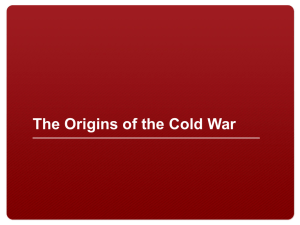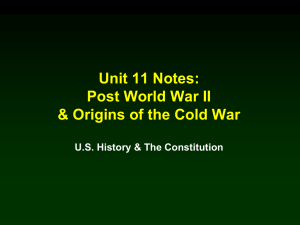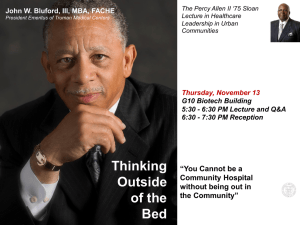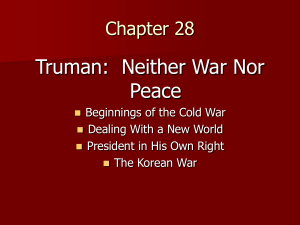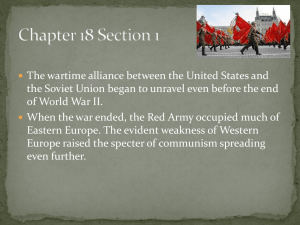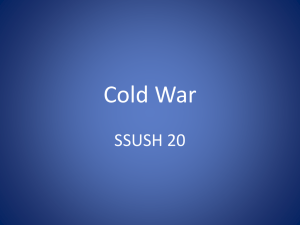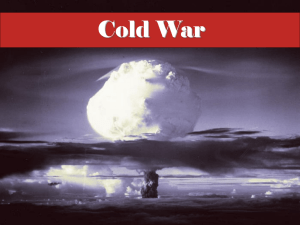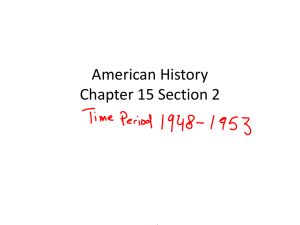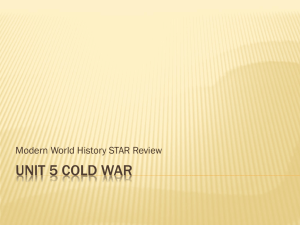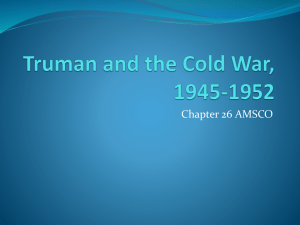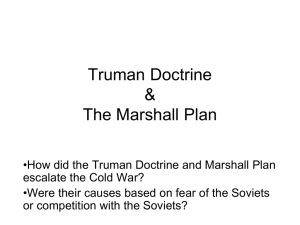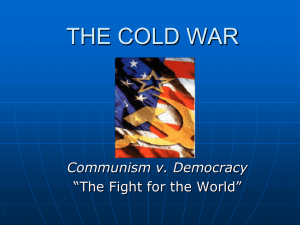The Truman Doctrine and McCarthyism
advertisement
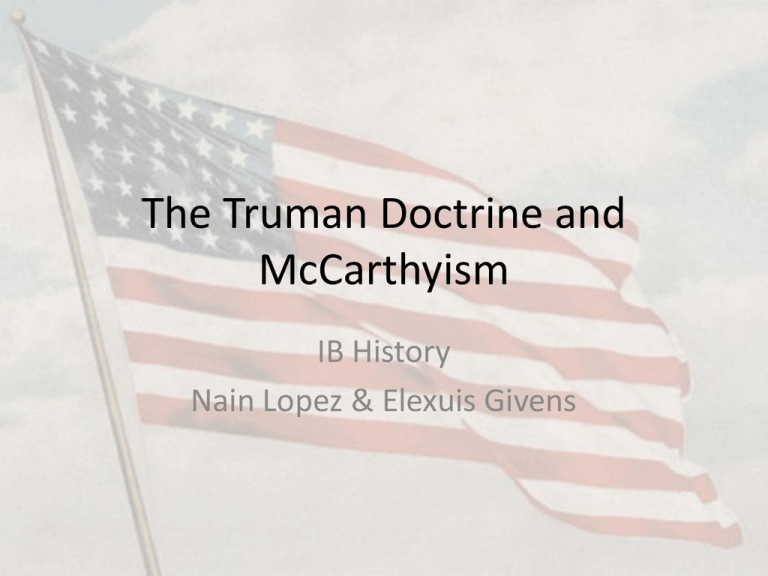
The Truman Doctrine and McCarthyism IB History Nain Lopez & Elexuis Givens Long Telegram from George Kennan • On February 22, 1946 George Kennan, The American charge d’ affaires in Moscow, sent an 8,000 word telegram to the Department of State with his views on the Soviet Union, and U.S. foreign policy towards the Communist State. • In 1933 Kennan was among the U.S diplomats to help establish the first American embassy in the Soviet Union. Long Telegram Cont. • Throughout WWII he thought that President Franklin D. Roosevelt’s friendliness and cooperation with Soviet Leader Joseph Stalin was a bad idea. Less than a year after Roosevelt died Kennan was serving in Moscow and released his opinions in what came to be known as the Long Telegram. • He was convinced that the Soviets would try to expand their Sphere of Influence. Long Telegram Cont. • This telegram caused a sensation in Washington. • Stalin started making aggressive speeches and threatening gestures towards Iran and Turkey in 1945 to 1946 and this lead to the Truman Administration deciding to take a stance and rely on the nation’s military and economic muscle rather than diplomacy in dealing with the Soviets. Harry S. Truman The Truman Doctrine • The Truman Doctrine was made in 1947, it established that the United States would provide political, military, and economic assistance to all democratic nations under the threat from external or internal authoritarian forces. Truman Doctrine Cont. • The Truman doctrine came from a speech delivered by President Truman before a joint session of congress on March 12, 1947. The cause for the speech was an announcement from the British government made on March 31, that they would no longer provide military and economic assistance to the Greek government in its civil war against the Greek Communist Party. Truman Doctrine Cont. • Truman asked congress to support the Greek government against the Communists. He had also asked them to provide assistance for Turkey had also been dependent on the British for aid. The U.S. government believed that the Soviet Union supported the Greek Communist war effort and worried that if the communists won in the Greek Civil War, the soviets would influence Greek policy. Other foreign policy problems that influenced Truman’s decision to aid Turkey and Greece • 1. The soviet’s failure to withdraw their troops from Iran in early 1946. • 2. The soviet attempts to pressure the Iranian Government into granting them oil concessions. • 3.Soviet efforts to force the Turkish Government into granting them base and transit rights through Turkish Straits. Continued… • President Truman requested that congress provide $400,000,000 worth of aid to the Greek and Turkish Governments and support the dispatch of American civilian and military personnel and equipment to the region. He justified his request by saying that a victory by the Communist in the Greek Civil War would endanger the political stability of Turkey, which would undermine the political stability of the Middle East. Containment • Was a principle of the U.S. foreign policy that sought to prevent the expansion of Communist power (from 1947 to the mid 1970’s). This policy was used by the U.S. after WWII in the Truman Doctrine of 1947. • President Truman worried that communism threatened the democratic freedom of people because like the U.S. the Soviet Union wanted a world modeled on their own country’s society and values. Containment’s implications for the Americas • Positive implications: The Soviet Union would break up. People could still have their democratic rights. • Negative implications: Getting into a third war with the Soviet Union. The spread of Communism. Rio Pact • It was originally made Sep. 2, 1947 and came into force Dec. 3, 1948. The Rio pact was an agreement signed in 1947 in Rio De Janeiro by many countries of America. The main principle in its articles was that an attack against one was considered to be an attack on all of them. This was known as the hemispheric defense doctrine. The treaty came into force in 1948. In 1982 the Bahamas was the most recent country to sign it and ratify it. Rio Pact Cont. • One reason it was made was because after the Truman Doctrine was made the U.S. wished to make those new anti communist commitments permanent. Joseph McCarthy Joseph McCarthy • • • • • • • • • Born in Appleton, Wisconsin Marquette University Democrat early in his political years joined the Marines during World War II Republican candidate for the Wisconsin Senate seat McCarthy won the election and became Senator. re-election began to get closer February 9, 1950 The fear became known as the Red Scare McCarthyism • American public went crazy • chairman of the Government Committee on Operations of the Senate • accused several innocent citizens • “evil and unmatched in malice” Video • How to spot a Communist McCarthyism Black List • The people on McCarthy's list and others (actors, businesspeople and even foreign diplomats) were hauled into secretive hearings led by McCarthy and essentially accused of treason. McCarthy and Foreign Policy • McCarthy's actions were extreme, but they were similar to measures taken by state and municipal governments out of fear of a communist takeover. President Harry Truman's foreign policy, known as the Truman Doctrine, was created not long before McCarthy debuted his black list. The Truman Doctrine stood for decades as the U.S. Government’s reasoning for entering into uprisings, wars and disputes all over the globe. *Russia successfully donates their first atomic bomb. This escalates the global nuclear warhead stockpiling race. Happenings… • Russia successfully donates their first atomic bomb. This escalates the global nuclear warhead stockpiling race. • Mao Zedong and the Chinese Communist Party defeats the Chinese Nationalists in 1949. • NSC-68 is enacted in the Korean War from 1950 to 1953. • This policy reinvigorated the containment of the USSR. Mao Zedong Happenings… • The Korean War was fought to a stalemate in 1951. • This eroded domestic support for Truman • Eisenhower became a hero in WW2 and was elected President. • The enactment of the National Security Council was reinforced by his election. • Armistice signed in1953. President Eisenhower Happenings.. • John Foster Dulles becomes Secretary of State. • He was an Anti-Communist. • Enacts policy of Brinkmanship and Massive Retaliation. Happenings… • French Indochina in abandoned in 1954. • Eisenhower begins to give aid to Democratic South Vietnam in 1955. • Origins of the Vietnam Conflict. USSR • • • • Conflict between the Western nations (including the United States, Great Britain, France and other countries) and the Communist Eastern bloc (led by the Union of Soviet Socialists Republics or USSR) began almost as soon as the guns fell silent at the end of World War II (1939-45) The USSR oversaw the installation of pro-Soviet governments in many of the areas it had taken from the Nazis during the war In 1947, U.S. leaders introduced the Marshall Plan, a diplomatic initiative that provided aid to friendly nations to help them rebuild their war-damaged infrastructures and economies. In February 1948, a coup sponsored by the Soviet Union overthrew the democratic government of Czechoslovakia and brought that nation firmly into the Communist camp. Within a few days, U.S. leaders agreed to join discussions aimed at forming a joint security agreement with their European allies. USSR • The process gained new urgency in June of that year, when the USSR cut off ground access to Berlin, forcing the U.S., Britain and France to airlift supplies to their sectors of the German city, which had been partitioned between the Western Allies and the Soviets following World War II. NATO (North Atlantic Treaty Organization) • • • • April 4, 1949 of Belgium, Britain, Canada, Denmark, France, Iceland, Italy, Luxembourg, the Netherlands, Norway, Portugal and the United States NATO formed the backbone of the West's military bulwark against the USSR and its allies for the next 40 years, with its membership growing larger over the course of the Cold War era. Greece and Turkey were admitted in 1952, the Federal Republic of Germany (West Germany) in 1955 and Spain in 1982. Unhappy with its role in the organization, France opted to withdraw from military participation in NATO in 1966 and did not return until 1995. Warsaw Pact: The Communist Alliance • Like NATO, the Warsaw Pact focused on the objective of creating a coordinated defense among its member nations in order to deter an enemy attack. There was also an internal security component to the agreement that proved useful to the USSR. The alliance provided a mechanism for the Soviets to exercise even tighter control over the other Communist states in Eastern Europe and deter pact members from seeking greater autonomy • occurred until six years after the Western alliance came into being • inspired by the rearming of West Germany and its admission into NATO in 1955 Warsaw Pact: The Communist Alliance • In the mid-1950’sthe U.S. and a number of other NATO members began to advocate making West Germany part of the alliance and allowing it to form an army under tight restrictions • West Germany formally joined NATO on May 5, 1955, and the Warsaw Pact was signed less than two weeks later, on May 14 • Joining the USSR in the alliance were Albania, Bulgaria, Czechoslovakia, the German Democratic Republic (East Germany), Hungary, Poland and Romania. This lineup remained constant until the Cold War ended with the dismantling of all the Communist governments in Eastern Europe in 1989 and 1990 Sources • • • • • • • • • • • Offner, Arnold A. "President Truman and the Origins of the Cold War." BBC News. BBC, 17 Feb. 2011. Web. 16 Apr. 2013. "53a. McCarthyism." McCarthyism [ushistory.org]. Ushistory, 2008-2013. Web. 16 Apr. 2013. Memory, American. "Lesson 3: The Rise and Fall of Joseph McCarthy | EDSITEment." Lesson 3: The Rise and Fall of Joseph McCarthy | EDSITEment. The National Endorsment for the Humanities, 2000. Web. 18 Apr. 2013. Schmidt, Eric, and Jared Cohen. "McCarthyism, Red Scare, and Domestic Subversion - Discover the Networks." McCarthyism, Red Scare, and Domestic Subversion - Discover the Networks. A Guide to the Political Left, 14 Feb. 2005. Web. 18 Apr. 2013. Gerard, Pacillo. "Epistemologics." Epistemologics. Epistemologist, 08 Nov. 2010. Web. 18 Apr. 2013. USA. US Department of State. Office of the Historian. Office of the Historian, Bureau of Public Affairs, United States Department of State. By Bureau of Public Affairs. Office of the Historian, Bureau of Public Affairs, United States Department of State, n.d. Web. Apr.-May 2013 "Cold War." History.com. A&E Television Networks, 1996-2013. Web. 18 Apr. 2013 “Joseph McCarthy.” 2008. NNDB Tracking the Entire World. 2 Jun 2008 . “Joseph McCarthy (1908-1957).” Biography. 21 Apr 2003. Appleton History. 2 Jun 2008 . Simkin, John. “Joseph McCarthy.” Spartacus Educational. 30 May 2008 . Truman, Harry S. Telegram to Joseph McCarthy. Feb 1950. THE COLD WAR AND THE AMERICAS 1945-1981 TRUMAN: CONTAINMENT AND ITS IMPLICATIONS FOR THE AMERICAS: THE RISE OF MCCARTHYISM AND ITS EFFECT ON DOMESTIC AND FOREIGN POLICY; IMPACT ON SOCIETY AND CULTURE. By: NAIN LOPEZ & ELEXUIS GIVENS
